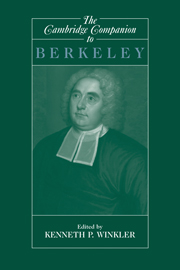Book contents
- Frontmatter
- Introduction
- 1 Berkeley’s life and works
- 2 Was Berkeley an empiricist or a rationalist?
- 3 Berkeley’s notebooks
- 4 Berkeley’s theory of vision and its reception
- 5 Berkeley and the doctrine of signs
- 6 Berkeley’s argument for immaterialism
- 7 Berkeley on minds and agency
- 8 Berkeley’s natural philosophy and philosophy of science
- 9 Berkeley’s philosophy of mathematics
- 10 Berkeley’s moral and political philosophy
- 11 Berkeley’s economic writings
- 12 Berkeley on religion
- Appendix
- Bibliography
- Index
5 - Berkeley and the doctrine of signs
Published online by Cambridge University Press: 28 August 2006
- Frontmatter
- Introduction
- 1 Berkeley’s life and works
- 2 Was Berkeley an empiricist or a rationalist?
- 3 Berkeley’s notebooks
- 4 Berkeley’s theory of vision and its reception
- 5 Berkeley and the doctrine of signs
- 6 Berkeley’s argument for immaterialism
- 7 Berkeley on minds and agency
- 8 Berkeley’s natural philosophy and philosophy of science
- 9 Berkeley’s philosophy of mathematics
- 10 Berkeley’s moral and political philosophy
- 11 Berkeley’s economic writings
- 12 Berkeley on religion
- Appendix
- Bibliography
- Index
Summary
In the final chapter of his Essay concerning Human Understanding, Locke divides all of human knowledge into three parts: the knowledge of things as they are; the skill of achieving what is good and useful; and the knowledge of signs. Locke calls the third part “logic,” “semiotics,” or “the doctrine of signs.” The present chapter is a survey and assessment of Berkeley's main contributions to this “great Province” (as Locke called it) of the early modern intellectual world. It was a province to which Berkeley attached particular importance and promise. In the seventh dialogue of Alciphron, his spokesperson Euphranor announces that he is “inclined to think the doctrine of signs a point of great importance and general extent, which, if duly considered, would cast no small light upon things, and afford a just and genuine solution of many difficulties” (ALC 7.13 [307]).
- Type
- Chapter
- Information
- The Cambridge Companion to Berkeley , pp. 125 - 165Publisher: Cambridge University PressPrint publication year: 2005
- 24
- Cited by



